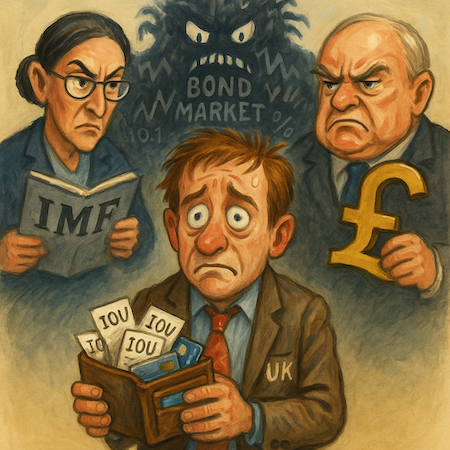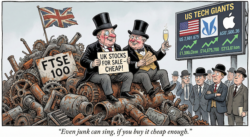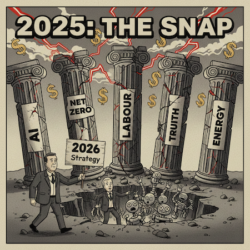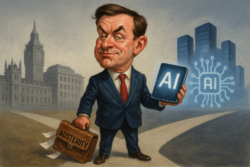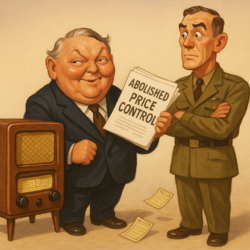- The IMF is waiting to pull our pants down
- Vigilantes, dictatorships and coups happen for a reason
- Who will the bogey man be for the UK?
What would your family finances look like if they were run as a democracy?
No doubt you’d enjoy the trips to Disneyland and hot air ballooning…for a while. At the height of the absurdity, you might even be inspired to join in the orgy of spending. If you can’t beat ‘em, join in.
But at some point, the financial reckoning would strike. The breadwinners might stop working quite so much. Or the bank could call to ask about their loan repayment, having heard from rather a lot of credit card companies about your spending lately. You’d learn the hard way why economists call this cautionary tale “the tragedy of the commons”.
At some point, there would have to be a coup. Or worse.
No doubt you don’t run your family finances in this way. It’s ironic that your financial decisions most benefit those who would vote against them in a democracy. It’s also insightful…for a Labour politician, anyway.
But I ask again, what if your family finances were run as a democracy? How would you try to ensure things don’t go off the rails in the obvious ways?
Impose government shutdowns, like America’s? Install power in an Office for Budget Responsibility? Make the central bank independent to avoid money printing? Legislate a binding balanced budget amendment while the kids are asleep?
None of these seems to be working terribly well in Western democracies…
There’s no shortage of politicians willing to explain to their electorate just how unsustainable the rate of spending is. But cut it? You must be joking!
Vigilantes, dictators and coups happen for a reason
When something can’t go on forever, it must eventually stop. Political theorists have always known this applies to financial management in a democracy:
“A democracy cannot exist as a permanent form of government. It can only exist until the voters discover that they can vote themselves largesse from the public treasury. From that moment on, the majority always votes for the candidates promising the most benefits from the public treasury with the result that a democracy always collapses over loose fiscal policy, always followed by a dictatorship.”
– Alexander Fraser Tytler
“When people discover they can vote themselves money that is the end of the Republic”
– attributed to Benjamin Franklin
The question for investors is how this episode of government debt binge will end.
We covered the possibilities before. But there’s an important point to note. Even if we get a bout of inflation, that only deals with past debt. A government must still balance the books after an inflationary burst that cut debt to GDP.
Failing to do this is what doomed Argentina to repeated crises.
Committing to do so is what got Germany out of hyperinflation in the 20s. The government stopped indexing civil servants’ salaries to inflation and the inflation promptly stopped. The clever man who made the change became a Nazi and the rest is history…
But how does a democracy balance the books? Is inflation enough of a wake-up call? Do voters even connect government deficits with inflation? Or do they believe in the central bankers’ claptrap about transitory supply chain shenanigans?
My theory today is that it takes an external force to wake up an electorate. A really nasty one.
The UK needed the IMF in the 70s. And the institution has been looming over our politics each time debt creeps up since.
Greece needed the whole Troika to impose austerity. The EU, IMF and ECB even forced the Greek government to ignore a referendum rejecting austerity.
Bill Clinton blamed the bond vigilantes for his government’s brief dalliance with austerity. That budget balance was largely creative accounting, but still admirable. Clinton’s advisor admitted it was the bond market that made them do it.
Italian politician Claudio Borghi explained just how powerful bond yields can be during Italy’s 2018 crisis:
In a way I am very happy because we have finally wiped the bull**** off the table. We now know that it is a choice between democracy or comfortable bond spreads.
You have to swear allegiance to the god of the euro in order to be allowed to have a political life in Italy. It worse than a religion.
What we are seeing is the fundamental problem with the eurozone construction; You can’t have a government that displeases the markets or the spread club. The ECB and the Eurogroup will use this to crush your economy.
You are very lucky in the United Kingdom that you still live in a free country.
These days, the UK’s bonds yield 1.3% more than Italy’s. It’s our government that is facing the tyranny of bond spreads. They can even fire prime ministers.
Germany’s frugal finances aren’t cultural. We Germans had to learn the hard way – hyperinflation. The German central bank’s aversion to inflation was so powerful that politicians could expect the Bundesbank to actively undermine any expansionist fiscal policy. Even the reunification of Germany was met with high interest rates from Buba because it involved more government spending.
I can’t work out how the Swedes pulled off austerity in the 90s. But I suppose they had someone to emulate in the UK. And a financial crisis to blame for their austerity. A bit like the UK’s laughable attempts to cut spending after the 2008 mess.
But the point is that democracies need some sort of external factor to wake them up to the need to cut spending. Someone to blame, someone to submit to, someone to fear, a bad example to want to avoid emulating, someone to beg for loan forgiveness. Otherwise, their democracy goes to the wall, and we get even worse.
Who will the bogey man be for the UK?
“We face a choice. Either we tighten our belt now or have our pants pulled down by the IMF in a few years’ time.” That’s how a Prime Minister should square with the people. Shortly before being stabbed in the back by their own political party…
A more realistic prospect is to give the people an enemy. Just as they blamed Putin for the energy spike caused by climate policy. Or supply chains for the inflation caused by the central bank.
It worked reasonably well.
Is the UK electorate scared of bond yields? Does the humiliating prospect of an IMF office in Westminster worry them? Would we tolerate a Bank of England that refuses to finance a democratically elected government, for our own good?
Democracy as we know it is over. We have a choice between dictators. The bond market, the central bank, the IMF or something worse.
Let’s hope voters fear these dictators more than austerity. And that politicians have the nous to identify the correct bogeyman to scare the electorate with.
For my kids, it’s dragons. They lurk behind every vending machine.
Until next time,

Nick Hubble
Editor at Large
P.S. If history teaches us anything, it’s that democracies rarely tighten the belt until something — or someone — forces their hand. That’s the real risk today. But for investors willing to look ahead, these moments of reckoning often come with opportunity. I call it the Wealth Window — a brief opening where foresight pays and paper assets falter. The question is: will you act before the window closes?
